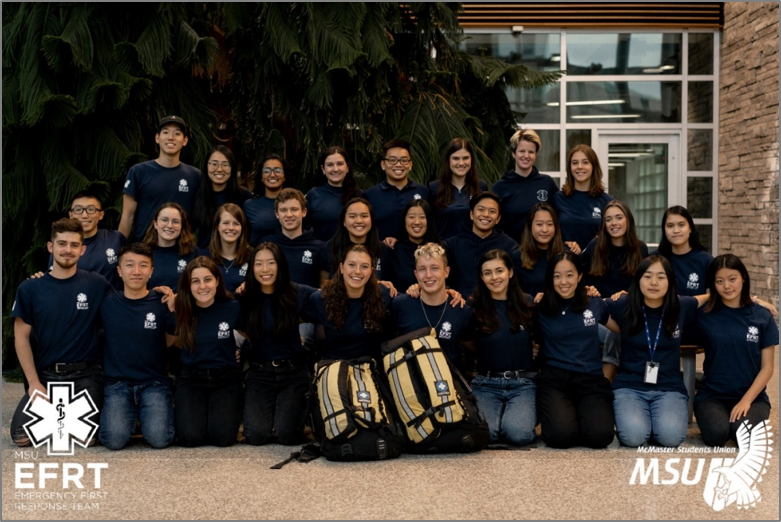At McMaster University in Hamilton, Ontario, a group of student volunteers are a part of the Emergency First Response Team (EFRT) which provides emergency medical services on campus. Team members carry medical equipment and life-saving medication such as epinephrine (e.g. EpiPen®) in their packs. We spoke to a member of the EFRT executive team to learn more about their group and other student-led teams.

What can you tell us about EFRT?
Several decades ago, undergraduate student Eddie Wasser raised concerns about lengthy EMS response times on campus with McMaster administration. He received support to start a student-led response team, and EFRT was launched in 1982.
The team is currently made up of 30 undergraduate students, and a large network of alumni who help run trainings and occasional shifts. Most of the individuals on the team are in Health Sciences, Kinesiology, and other science-based programs, however there are a few individuals in other programs, such as commerce. All responders on the team are Emergency Medical Responder (EMR) certified, and have a training in mental health crises, such as Applied Suicide Intervention Skills Training (ASIST) or Mental Health First Aid. More senior responders on the team have additional certifications, such as International Trauma Life Support.
How does someone on campus reach EFRT?
EFRT can be reached by calling a dedicated phone line, dialing “88” from a campus phone, or by coming to our office on the first floor of the McMaster student centre. When someone calls, they will speak to campus security who will then contact and dispatch EFRT. Most of our calls are from students although we do receive some from others in our campus community. We also volunteer at concerts and other large events on campus.
When EFRT is contacted, what process is followed?
Our on-call responders are notified about an incoming call by a page and a tone on their portable radio, and they pack up their things to get ready to go. This is followed by a dispatch, indicating the location of the call and what they are being called for, and responders travel to the individual’s location by bike, the fastest way to get around campus. We always work in teams of three when on call.
What types of emergencies do you handle?
We respond to any kind of emergency, including musculoskeletal injuries, allergic reactions, drug and alcohol emergencies, mental health emergencies and many more.
Within our packs, we carry equipment such as oxygen and airway equipment, an AED (automated external defibrillator), manual and automatic suction, tourniquets, wound care equipment, splints, and vital assessment equipment. We also carry life-saving medications such as epinephrine (e.g. EpiPen) and naloxone. EFRT are trained to recognize the symptoms of a severe allergic reaction (anaphylaxis) and they have administered EpiPens on a few occasions this school year already. Most reactions resulted from students eating a specific food on campus for the first time, not knowing that it contained their allergen.
We assess and treat the individual and involve emergency medical services as needed.
How do you work with campus security?
In addition to dispatching our calls, campus security also attends the calls with us. They are there for the safety of responders and will only intervene during our calls if something becomes unsafe. Overall, we work closely together, and they are a great support and resource for our responders.
Why is it important to have a student-led response team on campus?
We can respond quickly, within 5 minutes. Additionally, there are some personal situations in which students feel more comfortable calling us than paramedics. For example, someone who has been feeling unwell for a few days, but are unsure if they are sick enough to go to a hospital or a doctor. They will call us and through our assessment, we are able to help them make the best decision for what care they need.
How common are student-led response teams on Canadian campuses?
They are common, most schools in Canada have an emergency response team of students, with various levels of training and methods of running their service. EFRT was the first campus response team in North America and has acted as a model for numerous campuses.
Does EFRT engage with similar groups at other institutions?
Every year, there is a conference run by the Association of Canadian Emergency Response Teams of Canada (ACERT), in which the different teams in Canada come together and attend lectures as well as compete against each other. It is a great opportunity to get exposure to what other teams are doing and share common experiences. Additionally, there is a conference run by the National Collegiate Emergency Medical Services Foundation (NCEMSF) in the United States each year that some Canadian teams attend.
